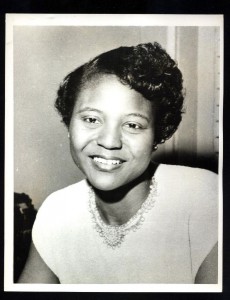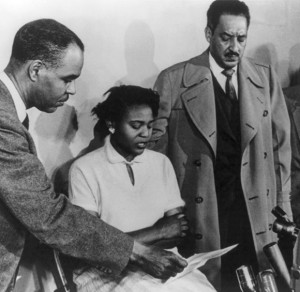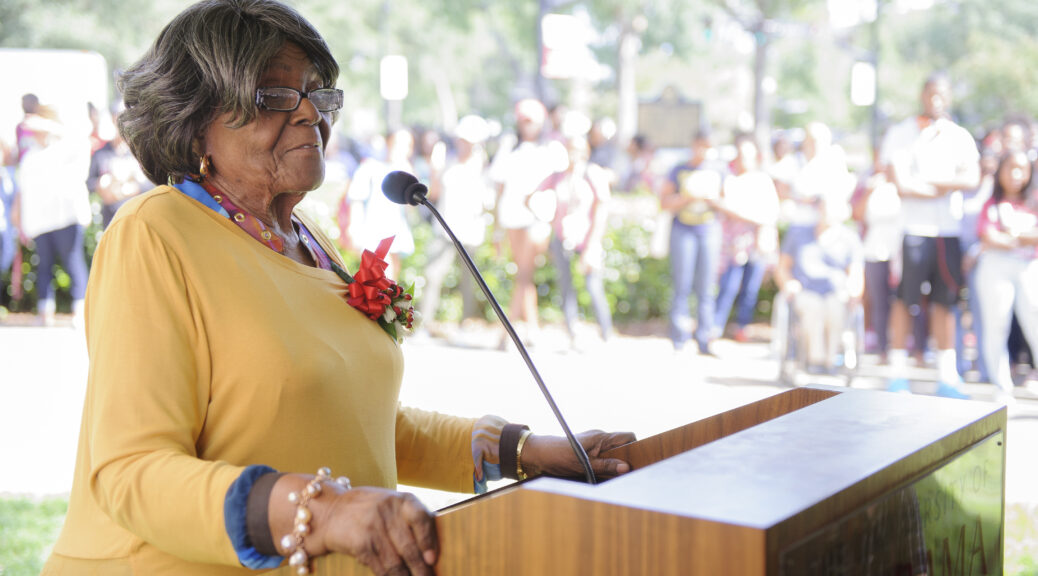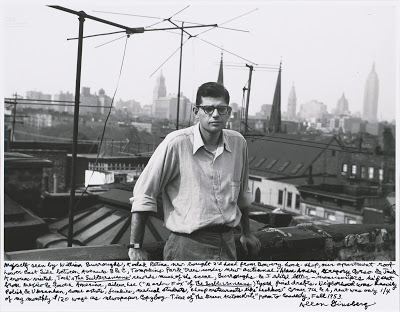Autherine J Lucy Foster
October 5, 1929 – March 2, 2022
Autherine Lucy was born in Shiloh, Alabama and She began classes at the University of Alabama on…
February 3, 1956
She was the first Black person to ever do so.

The name Autherine Lucy was not in my childhood history books. I hope her name is in them today, but am not sure about that. Rosa Parks, deservedly so, is and is perhaps the main Black female name in those books. Sojourner Truth, too.
Just as Claudette Colvin refusal to give up her seat on a bus had preceded Rosa Parks, Autherine Lucy’s struggle to attend a “White” university preceded James Meredith’s.
Autherine J Lucy Foster
Selma University
In 1947 Autherine Lucy attended Selma University for two years, then she studied at the all-black Miles College. She graduated from Miles with a BA in English in 1952.
In September 1952, Lucy and a friend, Pollie Myers applied to the University of Alabama. Both were accepted. Then school authorities discovered they were not white and their acceptances were rescinded.
Autherine J Lucy Foster
Lucy et al. v. ADAMS
Backed by the NAACP, Lucy and Myers charged the University of Alabama with racial discrimination in a court case that took almost three years to resolve.
On June 29, 1955, the NAACP secured a court order preventing the University from rejecting the admissions. The Dean of Admissions of the University of Alabama fought the court order.
On August 25, 1955, the United States District Court N. D. Alabama, W. D. decided for Lucy. In their decision they stated that, “Plaintiffs are entitled to a decree enjoining the defendant, William F. Adams, his servants, agents, assistants and employees, and those who might aid, abet, and act in concert with him, from denying the plaintiffs and others similarly situated the right to enroll in the University of Alabama and pursue courses of study thereat, solely on account of their race and color.”
The University appealed to the US Supreme Court, but on October 10, 1955, the Supreme Court upheld the lower court’s decision to admit Autherine Lucy and Pollie Ann Meyers.
Chief Justice Earl Warren wrote for the majority, The injunction which the District Court issued in this case, but suspended pending appeal to the Court of Appeals, is reinstated to the extent that it enjoins and restrains the respondent and others designated from denying these petitioners, solely on account of their race or color, the right to enroll in the University of Alabama and pursue courses of study there. The motion is denied.
Autherine J Lucy Foster
Attempts to begin school
February 2, 1956 the University of Alabama Board of Trustees rejected the now-married Polly Myers Hudson on the grounds of her “conduct and marital record” (Hudson had had a child before marrying). The Trustees likely hoped Lucy would not attend without a friend to be with.
Finally on February 3, 1956 26-year-old Lucy enrolled as a graduate student in library science. She was the first African American ever admitted to a white public school or university in Alabama.
But on February 4, 1956 New York Times article reported: Resentment over the first Negro student at the University of Alabama exploded today in a shouting demonstration of 1,000 man students. A car occupied by Negroes was damaged.

Autherine J Lucy Foster
Mob
A mob had assembled to prevent Autherine Lucy from attending classes. She was struck by eggs while being escorted across the campus and windows of the car in which she rode were smashed. Highway patrol officers slipped her away at the height of the demonstration when more than 3,000 students and others were on the campus.
Autherine J Lucy Foster
Editorial supports States Rights
That same day, the Augusta Chronicle ran an editorial, saying that the tragedy was not that Lucy was being denied her rights, but rather that the courts were usurping states’ rights by interfering with the University of Alabama’s admittance policy. The editorial concluded:
It is nothing less than tragic that the Supreme Court has furnished both the dynamite and the match by usurping the power of the various states to operate their schools, and other public facilities, in a manner best fitted to the needs and the welfare of all of their people. For this the court must bear the onus for ushering in an unhappy and tragic era in our history whereas before its decision, all was going well.
The next day, February 7, “The University of Alabama’s first Negro student was ordered excluded until further notice late last night for the “safety” of herself and other students and faculty members.”
And on January 18, 1957 Federal Judge Hobart H. Grooms ruled that University of Alabama officials were justified in expelling Autherine Lucy Foster and in March she stopped her struggle to attend.
Lucy became a high school English teacher.
Autherine J Lucy Foster
Justice delayed …
In April 1988, the university board overturned her expulsion. She re-enrolled in 1989 and in 1992 received her Masters in Elementary Education. The same day, her daughter, Grazia Foster received a bachelor’s degree in corporate finance. Grazi was one of 1,755 blacks among the 18,096 students on campus. (NYT article)
Marker
On September 15, 2017, the University of Alabama unveiled an historic marker honoring Autherine Lucy Foster. (Wall St Journal article).
She began her speech by saying, ““To the student body and to all of you standing around, I want you to know that the last time I saw a crowd like this at the University of Alabama . . .”
Irony Defined
February 3, 2022: in an amazingly ironic declaration, the University of Alabama renamed its Graves Hall to Lucy-Graves Hall. Bibb Graves was a former Alabama governor and an officer of the Ku Klux Klan. [Crimson White article]
According to a CBS42 article, a University of Alabama board member Judge John England said, ““On the one hand, Gov. Graves is regarded by historians as one of, if not the most, progressive and effective governors in the history of the state of Alabama, Some say he did more to directly benefit African American Alabamians than any other governor through his many reforms. Unfortunately, that same Gov. Graves was associated with the Ku Klux Klan. Not just associated with the Ku Klux Klan, but a Grand Cyclops. It’s hard for me to even say those words.”
Emulating the view that “When they go low, we go high,” Autherine Lucy Foster said she doesn’t mind having her name next to Graves’.
“Everybody can change,” she said. “Maybe he changed before he left this world.”
Irony Recognized
February 11, 2022: the University of Alabama reversed course and decided to remove Klansman’s Gov. Graves name and honor only Autherine Lucy on what was Graves Hall. [AL.com article]
Less than a month later, Ms Lucy died on March 2, 2022. [NYT article]









